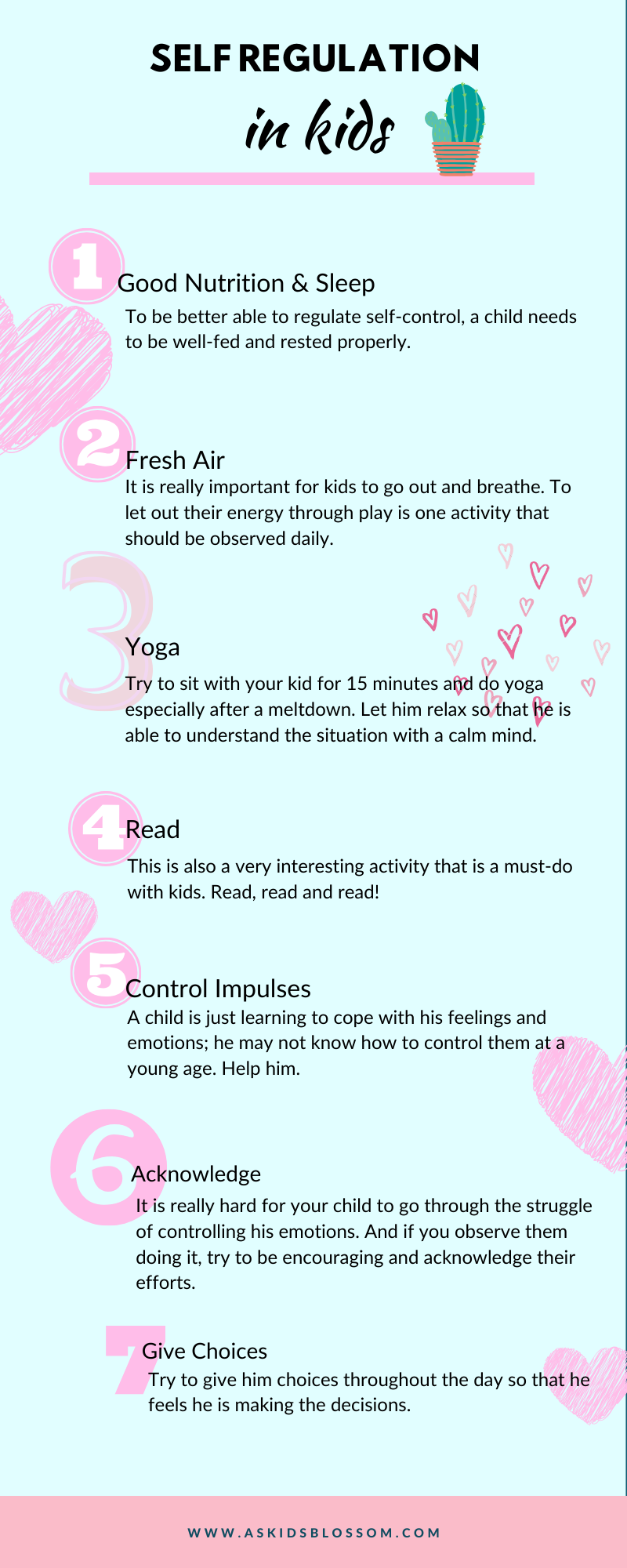Seeing a child cry, or throw a tantrum might seem upsetting to the parents, and even other people present, but let me tell you one thing; it is very normal.
In fact, I allow my kids to cry all the time. Even a tantrum is allowed once in a while (don’t judge me). That’s because a child’s emotional self is not on the same level as yours. His is still developing. There will be lapses, but with each lapse help your child regulate his emotions in a better way.
What is Self Regulation?
Self-regulation is how you control your emotions and behavior in a particular situation. Helping the kids, regulate their feelings and actions help them develop better social skills and learn to cope in difficult situations with calm.
7 habits to Develop Self Regulation in Kids
The thing with self-regulation is that it takes time. You can’t just develop it in one day, or even a week. Your child’s emotional self is developing, and with this, his self regulation skills will also develop. As parents, we can help them develop at a normal pace.
To help your child with the self-regulation skill you need to plan thoughtfully. Here we will discuss some ideas and practices for you to do with your kids.
Nutrition and sleep
To be better able to regulate self-control, a child needs to be well-fed and rested properly.
Think of yourself. We often feel drained after a whole day’s work and it is even more tiring and overwhelming when we skip our meal. I don’t know about you, but for me, lack of sleep makes me lose my temper. So, make sure both you and your child gets adequate sleep and nutrition.
Fresh air
It is really important for kids to go out and breathe. To let out their energy through play is one activity that should be observed daily.
When you walk or play outdoors, it releases happy hormones and calms your body. Increased heart rate and blood flow relax the mind and body. You need to try this one out with your kids, try going out for a 30 minutes’ walk or jog.
Yoga
Yoga or meditation is really helpful when you need to understand yourself. Try to sit with your kid for 15 minutes and do yoga especially after a meltdown. Let him relax so that he is able to understand the situation with a calm mind.
I do this with my kids, it develops within them the ability to understand and tackle situations that are beyond their comprehension.
Read
This is also a very interesting activity that is a must-do with kids. Read, read and read! I’ve always stressed on the importance of reading for kids.
Read books and ask questions related to the situations described in the book. You may discuss a character’s feelings and emotions. Ask questions,
‘How do you think he felt after the fall?’
‘Remember, you fell down that day, did it hurt?’
‘How does it feel when someone laughs when you fall down?’
Controlling Impulses
We need to try and make our kids achieve higher goals that are, empathy and social relationships. A child is just learning to cope with his feelings and emotions; he may not know how to control them at a young age. Help him.
We, parents standing at our spot, see it as a tantrum. It is not a tantrum but it’s just a way he is trying to express himself. We can try to prepare the child for tricky times.
Like for example before having to a play date, try to sit with him and discuss the situation. Use words such as you can take turns to play with a particular toy or he will be here only for a short period so why not play together. This will give him time to think about the situation beforehand. Choose your words kindly so that they do not hurt his feelings.
Acknowledge
It is really hard for your child to go through the struggle of controlling his emotions. And if you observe them doing it, try to be encouraging and acknowledge their efforts.
You may offer a strategy to help him with the struggle like for example when you are waiting for presents to open, you may offer him to let him touch, feel and guess the gift.
Give choices
Try to give him choices throughout the day so that he feels he is making the decisions. Would you like to play outside or indoors? Do you want to have carrots or cucumbers? Letting him make the decisions helps develop decision-making skills.
At a younger age, you can start with two options but as they grow older you may increase the options and in preteens, you may ask them to plan a day for themselves.

Sometimes it takes a lifetime to learn self-regulation but with these strategies, you may help your child to achieve at an early age. Be patient and try to give him time and space and you will be able to see the results yourself.
I hope this article will help you with self-regulation in kids. If you notice your child struggling and these strategies aren’t helping, I would love to help you determine your child’s individual needs. Please reach out to set up a free consultation. We are here to support you as you help your child blossom!
If you have any ideas on how to self regulate kids, please join us in our FREE Facebook community!
If you enjoyed reading 7 habits to Develop Self Regulation in Kids, you might also enjoy reading:
5 Healthy Habits to Incorporate Into Your Family’s Life
Three Games for Helping Children Follow Directions
